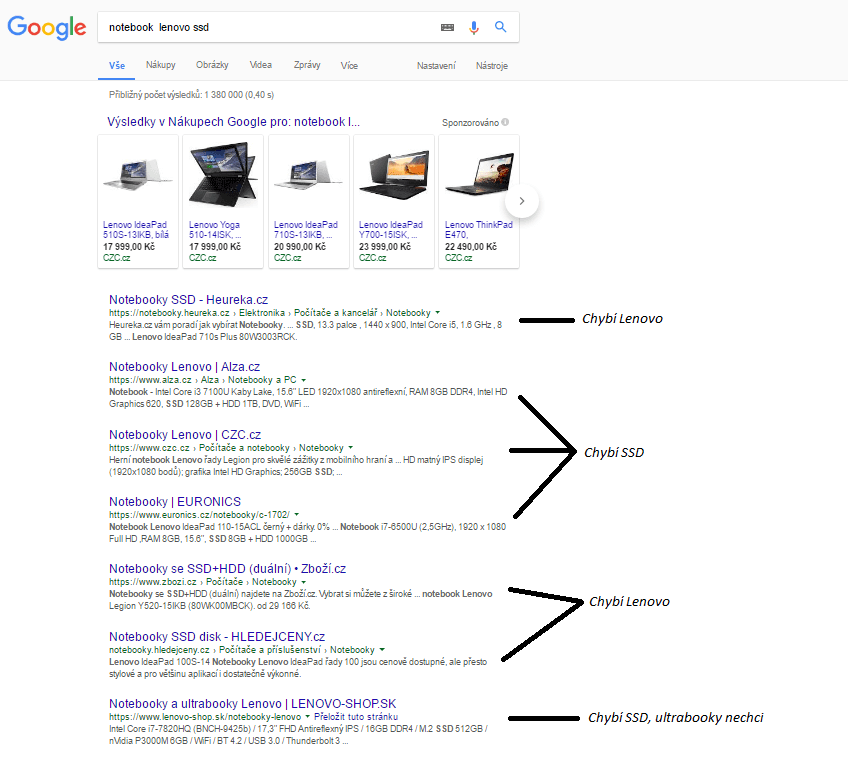I still encounter cases (most often with e-shops) where websites return incorrect landing pages. If you return an irrelevant landing page for specific queries, you may be losing visitors, or there may be a high bounce rate and low conversion ratio on the pages.
Imagine that you enter the query "notebook lenovo ssd" into a search engine. You expect websites offering relevant products to appear in the search results, but the opposite is true. Look at the screenshot where I marked why the landing pages are not relevant for the query.

As you can see, the search results include links to websites that mainly offer only one of the parameters I entered for the notebooks. Here you can see that people might skip these results and continue searching further. It is also necessary to say that websites appearing in top positions can respond with a relevant page – they have the specific type of notebooks on offer.
At the same time, this example clearly shows that being in the first position is not always a win. You may appear in top positions for queries, but if you return the wrong landing page, you might not have as high a click-through rate as a website below you offering a relevant landing page. Then it's up to the search engines to notice that the website below you offers a more relevant response and over time may reassess the positions and move you to worse positions than you are in now. Meanwhile, the website with the relevant landing page can move to the forefront of search engines.
How to find out which landing page I return for a query
If you are interested in what landing pages you return in search results, there are several possible solutions to analyze their current state. The analysis itself is quite simple, but optimizing websites to return the correct landing pages for people's queries is more difficult. If you want to start analyzing, you must meet certain prerequisites – or you can decide how to arrive at the result. Here are the options for analyzing landing pages:
- using Google Analytics
- directly in Google Analytics
- using external tools – Google Data Studio, Power BI, …
- using tools to remeasure positions + determine the landing page
There are more ways to proceed, but in my opinion, these are the simplest ways to find out whether you are returning the correct or wrong landing page for a specific query. In this article, I will focus on method number 1 – i.e., analysis using Google Analytics. However, if there is interest, I will create a guide for you in Google Data Studio, where you can better illustrate the results for easier data analysis.
The procedure could also be used for other marketing sources, but we will focus on organic search results (i.e., the unpaid part of search results).
Google Analytics – Does the search engine return the correct landing page?
Let's look together at how you can use Google Analytics to get an overview of what landing pages you return for specific queries in search engines.
- Log in to Google Analytics
- Select the website you want to analyze
- In the left menu, select "Acquisition" -> "Overview"
- Choose "Organic Search"
- Add a secondary dimension – "Landing Page"

- We can filter the data using an advanced filter from "np – /"; (not provided)
- choose an advanced filter
- exclude from keywords everything you don't want to be included in your analysis

Now you should have an overview of keywords and the associated landing page for organic only. You can check if you are responding with a relevant landing page to queries. You can also see if you have a higher percentage of exits and lower conversion than on relevant landing pages – this is usually the case for most websites.
If you discover that you are returning the wrong landing page, you can start optimizing your websites. Thanks to this, you can
- increase the number of visitors from search engines
- reduce the bounce rate
- increase the conversion ratio and thus increase revenue/profits
- increase the time spent on the page
Why I don't return a relevant landing page
If you want to focus on the reasons why the search engine does not return the correct landing page, then you will need to work on analyzing the current state of your websites.
There can be several reasons why a search engine returns a different landing page than you wish. Let's look at the points that can affect the returning landing page:
- poor internal linking of websites
- fragmentation of strength within link-building activities (e.g., you direct links with bad anchor texts, backlinks lead to different pages than they should -> you increase the strength of other pages than those needed)
- search engine's lack of knowledge – it doesn't know about the correct landing page -> there could be a noindex set on the page, a ban in robots.txt, parameterized URL of the landing page,…
- or perhaps the most serious problem – do you have the landing page created? 🙂
There can be many more reasons, but these points are always a good starting point. Each project may have a completely different reason.
TIP: For visualizing internal website linking, you can use the Gephi tool.
TIP: You can check if you return the correct landing page for different search engines – for example, you may return the correct landing page on Seznam, but on Google, the landing page may already be irrelevant.
Try the mentioned method to discover whether you respond with landing pages to people's queries. In a short time, you can uncover possible pitfalls of your websites.





